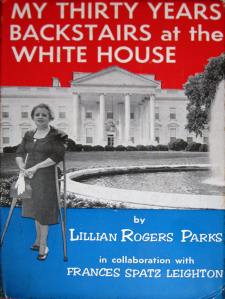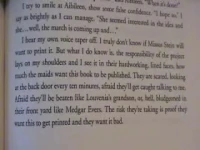If you’ve ever wondered what actual black domestics had to say about their working conditions and their lives as African Americans in this country during slavery and segregation, here are a few books (and even a DVD) that may be of interest.

In 1865, Paul Jennings wrote about being The Help in The White House in "A Colored Man's Reminiscences of James Madison"
“Mr. Madison, I think, was one of the best men that ever lived. I never saw him in a passion, and never knew him to strike a slave, although he had over one hundred; neither would he allow an overseer to do it. Whenever any slaves were reported to him as stealing or “cutting up” badly, he would send for them and admonish them privately, and never mortify them by doing it before others. They generally served him very faithfully. He was temperate in his habits. I don’t think he drank a quart of brandy in his whole life. He ate light breakfasts and no suppers, but rather a hearty dinner, with which he took invariably but one glass of wine. When he had hard drinkers at his table, who had put away his choice Madeira pretty freely, in response to their numerous toasts, he would just touch the glass to his lips, or dilute it with water, as they pushed”
© This work is the property of the University of North Carolina at Chapel Hill. It may be used freely by individuals for research, teaching and personal use as long as this statement of availability is included in the text.
You can read the complete text of Paul Jenning’s account of working for President James Madison here:

Josephine Street Kitchen, New Orleans 1939
In 1940 Naomi Watts wrote I AM A DOMESTIC
“It is not only the long hours, the small pay, and the lack of privacy – we often have to share a room with the children – that we maids find hardest to bear. It is being treated most of the time as though we are completely lacking in human dignity and self- respect. During my first year at this work I was continually hopeful. But now I know that when I enter that service elevator I should park my self-respect along with the garbage that clutters it. Self- respect is a luxury I cannot retain and still hold my job. My last one was a good example of this . . . ”
An excerpt from “I Am a Domestic,” by Naomi Ward, published in New Masses (June 1940)
Read more of what Naomi had to say here: https://acriticalreviewofthehelp.wordpress.com/2010/12/12/i-am-a-domestic/
There’s also the novel Willie Mae, as recounted by author Rebecca Sharpless on the UNC Press blog:

Willie Mae
“. . . For decades, oral history interviews conducted by both African American and white researchers have documented the lives of domestic workers across the South. There were a sprinkling of interviews before the 1950s, when one brave African American woman, Willie Mae Wright, did in fact speak out, to a white woman, Elizabeth Kytle. Wright, a domestic worker in Atlanta, dictated her “first-person biography” to Kytle, who published the book, simply titled Willie Mae, with Alfred Knopf in 1958. While the book is not without its problems, Wright tells stories that are funny, stories that are harrowing, and she depicts vividly the struggles of the Jim Crow South. Neither Knopf nor the University of Georgia Press, which reprinted Willie Mae in 1993, can verify Wright’s identity or her whereabouts. But her words remain available to any who will read them.”
In 1961, both Alonzo Fields and Lillian Rodgers Parks had their memoirs published, recalling their time as domestics in The White House.
Click image for a larger view:

In 1961 Alonzo Fields wrote of his 21 years in the White House
Here’s an original excerpt of notes from Mr. Fields. Click the image for a larger view:
Here’s Lillian Rodgers Parks novel:

Lillian Rodgers Parks, seamstress and maid for the white house. A light complexioned, black domestic

This is Lillian Rodgers Parks, a light complexioned African American. She was a maid and seamstress at The White House from 1929 until 1960

Opening sequence for the 1979 mini-series Backstairs at the White House

Opening Credits for Backstairs at the White House

Olivia Cole as Maggie Rodgers, Lillian's mother who worked as a maid in The White House

Leslie Uggams as Lillian Rodgers Parks in Backstairs at the White House
Their supporting cast in this NBC miniseries featured some of the most talented and FINEST men on screen:

Robert Hooks

Louis Gossett Jr.

Paul Winfield

Bill Overton

Hari Rhodes

David Downing
The mini-series was filled with stars:

Leslie Nielsen

Cloris Leachman
THIS POST IS STILL BEING DEVELOPED























August 11th, 2011 → 12:02 pm
[…] on the Evers’ death and how the author mistakenly recalls it. The blog also notes that African American domestics did write books, although most were accounts of the situation in the North such as the 1965 “Colored […]